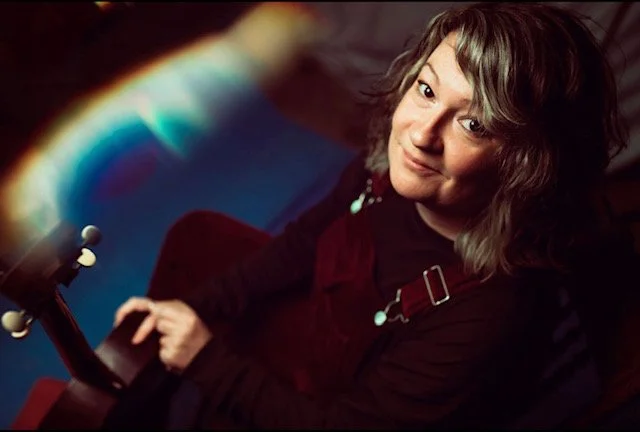SOLD OUT!
Doors + bar @ 7pm - Music @ 7:30
Seated Listening Room Show
The power of three. The Alluvion proudly welcomes our dear friends Rachael Davis, May Erlewine, and Lindsay Lou aka The Sweet Water Warblers for an evening of soulful, three part harmony magic.
If the whole is greater than the sum of its parts, then The Sweet Water Warblers are no exception. Comprised of Michigan songbirds Rachael Davis, Lindsay Lou, and May Erlewine, the folk trio’s organic vocal harmonies and seamlessly interwoven instrumentation leaves listeners breathless.
The Sweet Water Warblers came together in 2014, for a single performance at the Hoxeyville Music Festival upon request by the promoter. From the beginning, there was a unique connection between the three artists, a bond forged by a mutual passion for social change and expansion of the soul through music. Each of the ladies’ brought with them a regarded solo career within the Americana and roots worlds, and with them individual perspectives on traditional music. Whether it was the gospel and soul-laced melodies uncovered in Davis’ music, the Appalachian folk and country-leaning ballads belted out by Erlewine, or the versatile country soul and bluegrass roots of Lou’s band it was clear from the beginning that the culmination of their talents would be unparalleled.
With three-part vocal harmonies that are sublime, the singing sirens and multi-instrumentalists saw the release of their first EP, With You, in 2017. The repertoire swinging from gospel and bluegrass to soul and even joyful interpretations of pop, AmericanaUK called it, “top drawer roots music.”
The Warblers released their first full studio album, The Dream That Holds This Child, in May of 2020. Produced by Dan Knobler (Lake Street Dive, Caroline Spence), the album serves to empower and uplift spirits, and offer refuge, solidarity and support through its focus on modern femininity. “Our sound is a place of refuge. Its roots are deep, and its arms are stretched open wide,” says Lou. “This is the gospel of creating beauty from pain.”
“We recognize an imbalance in the imagery and symbolism of the divine,” adds Davis. “When we sing gospel, we sing from a source deep within us that honors and elevates the feminine as much as the masculine.” The artists’ statements come with disclaimer — not to mistake the album’s nurturing tenderness for weakness. These songs bloomed from the deep darkness of the earth and were sung awake through relentless storm. As Erlewine puts it, “We are here, very much, on purpose.”
Want to stay in the loop for upcoming Alluvion shows and events? Be the first to know what’s happening next by signing up for our email updates here: Join our email list
GET TO KNOW THE BAND:
Rachael Davis
Rachael Davis: Multi-instrumentalist Rachael Davis is as renown for her expressive--and explosive--voice as she is for uniting the often disparate worlds of folk, blues, country, and pop. Davis grew up not only in a family of musicians, but in an extended village of remarkable musicians and songwriters who nurtured and mentored her from the time she was born. Beginning by jingling ankle bells in perfect time on her months old feet in the middle of old timey jams and song circles, to contributing newly minted songs to Music Sundays, Rachael has always found her own unique part in the music. Her clear tone and uncanny memory for just about every song she’s ever heard came early, and has served her well throughout her career. As a child Davis took to harmony, piano, and ukulele, and at 8, joined the family band Lake Effect, performing regularly at folk festivals throughout her home state of Michigan and around the U.S. By age 12, and continuing each year since, Rachael has brought the Wheatland Music Festival to its knees closing the Sunday morning gospel set with her stunning solo acapella version of Amazing Grace.
“I was learning everything I could get my hands on and when I was 17, my father gave me his Bart Reiter banjo and taught me to play clawhammer style,” recalled Davis. “I like to joke that cursed me for life.”
At 20, already a professional and deeply moved by traditional mountain music, blues, and ballads, Davis composed and recorded her debut album “Minor League Deities,” then with that, and a heart full of promise Rachael Davis headed to Boston the day after the 911 attack. There she began performing in city subways and the streets of Cambridge. Within months she had made her mark on the Boston music scene winning the prestigious Boston Music Award for Best New Singer/Songwriter. Davis often found sanctuary in the city’s basement level record stores as well as Boston’s premier acoustic music clubs where she made fans and friends of local stage veterans Vance Gilbert, Cheryl Wheeler, Josh Ritter, and indie rock’s parade float princess, Mary Lou Lord.
“In a way, they’re all still with me today,” says Davis, “I was part of a real music community there. My story was just like theirs. We all knew we were on a path to find something and for that moment, we were all in the same place.”
Because Davis has been swayed by so many different types of music, her style is difficult to file and will not languorously rest amid broader musical genres. "My slant on acoustic music can be explained by a mixed cassette tape that my father played during my early childhood while driving in our family’s Chevy Cavalier station wagon we nicknamed Iggy. On one side of the cassette was the soundtrack for the film The Big Chill. On the other was John Hartford’s “Areoplane”." Today Davis describes her music as ‘Motown-Banjo’.
Davis has lent her voice to countless recordings for friends, film soundtracks, and even video games, but it is her intuitive and empathetic understanding of folk music—“the music of folks” as she calls it, and her original and thoughtful songwriting voice that has earned her fans around the U.S.
Rachael Davis now lives in Nashville, Tennessee with her husband, critically acclaimed bassist, Dominic John Davis, with whom she performs as The Davis Duo. Together they cultivate a diverse community steeped in music, art, travel and love, and are raising a son and daughter at the center of it all. view.
May Erlewine
May Erlewine: One of the Midwest’s most prolific and passionate songwriters, Erlewine has a gift for writing songs of substance that feel both fresh and soulfully familiar. Her ability to emotionally engage with an audience has earned her a dedicated following far beyond her Michigan roots. She shows us her heartbreak, but she also shows us her empowered and emboldened spirit. In her quest to find her most authentic self, Erlewine gifts each listener with a powerful, emotional experience that immediately connects us.
Raised in a home full of art and music, Erlewine began writing songs at a very young age. As a teenager she hitchhiked across the country, honing her skills as a performer and absorbing the kind of stories and landscapes that would inform her music. Her songs show a very real connection and concern with everyday folk.
Erlewine draws from a wide variety of influences to create her sound. Lyrically, her songs are rooted in hard-wrought wisdom, joy and sorrow, simplicity, and stories from her own experiences. Musically, May's songs wash over the audience like a tender hug. She is a magnetic solo performer and is also often supported by her carefully chosen backing bands.
Erlewine uses her music as a platform for positive change. She considers her job a service-oriented one and carries the torch of the folk-singer activist. Her voice on stage encourages connectedness and stresses the importance of environmental advocacy, social justice, creative empowerment and community building as necessary work for all of us.
Erlewine’s music has touched people all over the world. Her words have held solace for weary hearts, offered a light in the darkness, and held space for the pain and joy of being alive in these times. She is a true artist, an anthem, and another example of why we need to listen to women. We need to hear these stories. When she starts to sing, there’s no way around it: The time is now.
Lindsay Lou
Lindsay Lou: “Guided by life experiences, Lindsay Lou's sound and songwriting continues to evolve and intertwine her sturdy Bluegrass roots with progressive Americana and Folk.” – PBS
“I saw a literal manifestation of the sacred feminine, and had this profound sense that I was meant to embody it,” recalls celebrated singer-songwriter Lindsay Lou after journeying through a hallucinogenic ritual that would inform the way she processed waves of grief in the sea of change ahead of her. The loss of her grandmother, the end of her marriage, and the overwhelming turmoil of COVID lockdowns found the Nashville-based artist on a spiritual journey of self-knowledge and healing with this gift from the mystic swirl. On her new album Queen of Time (due September 29th from Kill Rock Stars), Lou explores that quest across ten tracks of tender, heartbreakingly beautiful music.
With this new vision of womanhood in mind, Lou began to see a throughline from her grandmother, to herself, to the art she was creating. Her 2018 release, Southland (recorded with her former band, The Flatbellys), felt like the first chapter to a greater story that was unfolding; with this release, the theme deepened. “It started with my grandma. She was the unattainable woman in a way,” Lou explains. “She had 12 kids and ran homeless shelters and was always taking people in. She felt that her calling was to be a mother to everyone – this communal caregiver – but it also meant that in belonging to everyone, she also belonged to no one. I realized that this is the catch-22 of anyone who is a woman unto herself. Women, first and foremost, belong to themselves, so nobody can really have them; but, there's also this element of self-sacrificing and giving to the idea of the feminine.”
Lou’s vocals are a powerful companion to her songwriting. “In an era when style and trends can become genericana, [Lou] focuses on the song,” said No Depression. “It is infectious and joyful, soulful even.” The undeniable centerpiece throughout Queen of Time, Lou’s voice is a molasses-sweet instrument equally capable of clarion ache, slicing deep into the soul. The daughter of a literal coal-miner and millwright, and the granddaughter of a teacher gone Rainbow Gathering healer, Lou honed her honest and resonant style with her bluegrass-inspired band, Lindsay Lou & The Flatbellys, and Michigan supergroup, Sweet Water Warblers (Rachael Davis, May Erlewine), excavating elements of bluegrass, folk, Americana, and soulful pop for their emotional depths. The Warblers’ debut album, The Dream That Holds This Child (2020), was dubbed “a testament to the trio’s range” by Billboard, running the gamut of blues, gospel, soul, and Appalachian folk.
On this latest record, Lou has refined those gemstones to a brilliant luster, holding the listener’s hand on the path filled with heartbreak, discovery, and resilience. On “Nothing Else Matters” (co-written by Nashville musicians Maya de Vitry and Phoebe Hunt), Lou blends those emotions into one vibrant present. The track features GRAMMY® Award winner Jerry Douglas, his immediately recognizable dobro work helping Lou tap into her bluegrass roots while she unravels this new vision of the world. “There is something incredibly iconic to Jerry’s playing; it’s unmistakable,” says Lou. “Like every touch of his bar to the string speaks exactly to the heart of the song. I feel really honored to have his musical voice among the players.”
Lou explores the continued theme of duality on lead single and album namesake “Queen of Time”, her limber, golden vocals backed by a suite of acoustic guitar, psychedelic synth and an energetic rhythm section. The song’s lyrics play out like zen koans. “I’ve spent years at this point, listening and reflecting on this record. ‘Queen of Time’ seems to embody the entire work’s theme of self-discovery in a way that almost feels like a wake up slap in the face; like if it was a snake, it would have bit me,” says Lou. “And I think that’s kinda the nature of self-discovery. It’s discovering something you knew all along.”
On the radiant “On Your Side (Starman)”, Lou sings to a loved one through rose-colored glasses, as if they were her hero. “You can be the starman/ The lightning in the sky/ I will be a shelter/ ‘Cause I am on your side,'' she sings, a lithe mandolin bolstering her serene offer of support. Bathed in harmonies and supported by a honeyed troupe of pedal steel, guitars, and a splashy percussion section, Lou sounds like a heroine herself, a gleaming bastion of strength and love.
Elsewhere, “Nothing’s Working” finds Lou dueting with GRAMMY®-winning guitar virtuoso Billy Strings on their co-write. (You can hear String’s version of it, accompanying Lou, on his 2020 release Renewal). “This was another track that came together over the course of a few years; it lived as the first verse alone for a long time,” recalls Lou. “A suicide in our community stirred me to finish the lyrics, and pandemic gave Billy and I some extra time at home to flush it out.”
The message comes through in the lyrics as Lou sings, “Take time to listen to the quiet ones/ Watch how the rain gives up a chance to swim/ Burn the broken bridges and build them up again,” the duo crying out for change in the face of the endless pain and violence in personal lives and spread across the media. String’s flat-picked guitar ripples and writhes, a deep purple smoke pervading the track.
“I’ve been fortunate to have spent formative years surrounded by immensely talented friends and collaborators, who, like Billy, feel more like family at this point.” explains Lou. “Having them lend their voices to this record is very special to me.”
Lou’s devotion to understanding where she came from plays a central role not only in the ethos of Queen of Time, but in its sound. “I have 27 hours of conversations that I recorded with my grandma, her telling me her story and explaining how she developed her unorthodox, somewhat radical, somewhat fringe philosophy,” Lou says with a wistful smile. Snippets of those recordings are infused into the album, as in the delightfully Calypso-flecked “Love Calls”. And as the album nears its end, another call to grandma helps exorcize the pain of death. “Nothing can stay bad forever,” Grandma Nancy reminds us, and you can feel the tears being wiped aside and replaced by something new—hope and resilience.
Named among NPR’s “12 Best Live Performances” in 2015, Lou has long been beloved as a live performer, from Telluride Bluegrass Festival to Stagecoach, Celtic Connections to Australia’s National Folk Festival, and a “Can’t Miss Act” at AmericanaFest—not to mention acclaim from PBS, No Depression, Billboard, Holler, Paste, and The Bluegrass Situation, among other outlets. But on Queen of Time, Lou captures a new arc of haloed beauty, becoming unattainable in her own way—a vibrant, powerful woman who can share herself with the world, and yet define a mystic sense of inner self as well.





